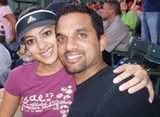Razib calls attention to a life-or-death situation affecting many minorities in this country: lack of organ and tissue matches for those in need of a transplant. He highlights one man in immediate need of a bone marrow transplant:

A tragedy, in five lines;This is Vinay and his wife Rashmi.
They were married in 2005.
He was diagnosed with a rare form of leukemia in 2006.
He is 28.
He needs a bone marrow transplant, in the next six weeks.
It's easy to join the bone marrow registry. You can check out the registration and donation steps here, and pretty much anyone who's healthy and between the ages of 18 and 60 can list themselves on the registry and be tissue-typed. I've been on it for a number of years, since I enrolled as part of a call for donors after a girl I used to babysit for was diagnosed with Hodgkin's lymphoma. It was already too late for her--she died at the age of 21 after a short battle with the disease. Unfortunately, her story is all too typical--the National Marrow Donor Program estimates that 35,000 people could benefit from marrow transplants every year, but only a small number of those actually receive them. While the best matches can come from other family members, only about a third of those in need actually find a matching relative--the rest turn to unrelated donors in the hope of a match. Even for those of European descent, the odds of finding an unrelated match aren't great; with minorities, the odds go down considerably. (You can see the relative numbers in this publication if you're interested).
To find a match for Vinjay, his friends and relatives have organized a number of drives (mostly in California, where he's from), that can be found at his website. No matter where you live, however, you can find a site near you to get registered, or help in other ways. And while the call to help Vinjay is going out specifically to those of South Asian descent (since that would be his most likely match), it should be pointed out that there are still only about 10 million people registered worldwide--so people of all ethnic groups are still desperately needed.
Image from http://www.helpvinay.org/images/photos/vinay_rashmi_2007_05_31_rev_150p…
- Log in to post comments

Yes I am on the registry.
I got on once when I was donating blood, which I do juat about every 8 weeks. They call just about as soon as I become eligible again.
It is something that everyone should do if they are able to, not everyone can.
On the list too. It's discouraging to think of how many people are eligible to donate, but can't be bothered. Do unto others, people!
One other thing - if you registered as a marrow donor but have since changed your contact information, they wouldn't have any way of letting you know you were needed. You can give them your new address/phone at 800-243-5124.
You can update your information online as well.
I have a question, does a bone marrow transplant cure leukemia, or just help it to go into remission? And does Leukemia come back? When I was researching this I found lots of info saying that transplants are necessary, but I can't figure out exactly what they do. Just curious.
haydin,
I think in most cases the bone marrow transplant is to save your life after they give you chemo/radiation to kill all of your bone marrow. They kill your bone marrow (where the cancerous cells are originating) then give you good bone barrow that will repopulate your bone.
You need bone marrow to make all of your blood cells. I think the longest lived blood cells in your blood is about 90 days (red blood cells), so if you don't have bone marrow to regenerate that population of cells, you're through.
I'm on the registry. I'm bi-racial, which I suppose is even worse from the standpoint of finding a match. Most of my relatives aren't the same racial group as me. I guess if I ever need a transplant and my siblings aren't a match, I'm probably screwed. A lot of multiracial groups are actively working to get minorities registered, which is a wonderful thing.
I do need to check to see if changes in my health since I joined disqualify me. Anyone know if there's a nice, long, comprehensive list of conditions and how they effect eligibility?
For the most part, the disqualifications are pretty much the same as for donating blood, self-injected drugs, sex with HIV positive individuals, recent STDs, trading sex for drugs or money, malaria, hepatitis, that sort of thing. I am sure they ask about all of those things when and if the time ever comes.
Yeah, if you match, you still have to undergo a physical and new health check, to make sure there are no new issues from when you first joined the registry.
I have been told, that the bone marrow is taken under general anesthesia, which requires a physical anyway.
I looked on the site and was told that I can't donate due to having fibromyalgia. Hm. The local blood center has no problem taking my blood.